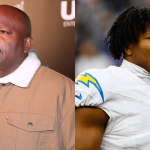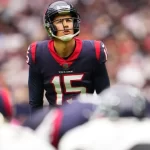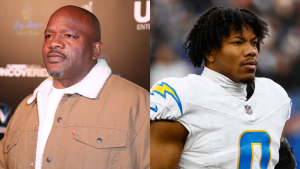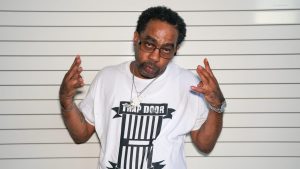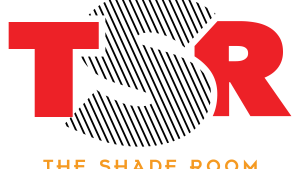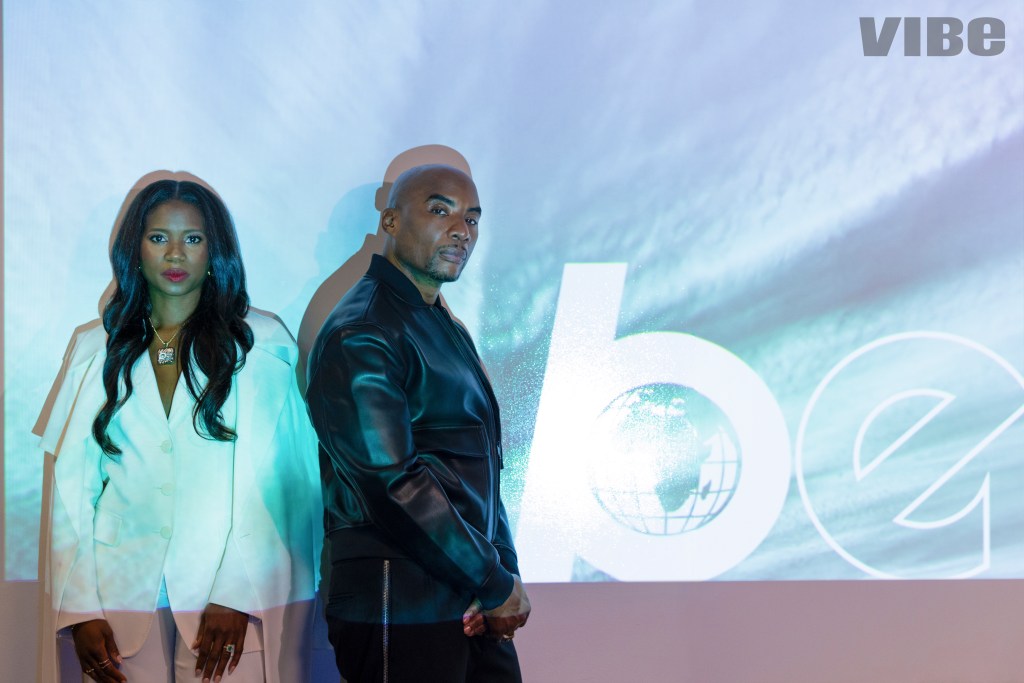
TALK HEAVY! Inside The Black Effect’s Five-Year Reign
If there’s one thing Charlamagne Tha God has never been accused of, it’s silence.
For years, the man has made a living — a good living — off the simple act of running his mouth. He’s debated Hip-Hop icons before breakfast, grilled politicians before lunch, and can even be found on Comedy Central sparking national conversation just before your evening nightcap. To the man born Lenard McKelvey, a microphone isn’t just a tool — it’s an instrument, a weapon, and a confessional booth rolled into one.
It was only a matter of time before he decided to build an empire out of it. In 2020, he launched The Black Effect Podcast Network, a platform dedicated to amplifying Black voices, perspectives, and experiences in all of their complexity. What started as a big idea (and a few bold calls to iHeartMedia) has become a powerhouse — a cultural echo chamber where storytellers, truth-tellers, and comedians all come to do what Charlamagne does best: talk that talk.
And then there’s Dollie S. Bishop, the Brooklyn-born, South Carolina-raised television maven-turned podcasting pro who makes sure he walks the walk. As President of Production and Creative Development at The Black Effect Podcast Network, Bishop is the steady hand behind the mics who turn all that talk into traction. While Charlamagne might light the spark, Bishop keeps the fire burning — overseeing strategy, partnerships, and the delicate art of keeping a creative network profitable and purposeful. Charlamagne is the mouth, Dollie is the muscle — the one who makes sure ideas turn into institutions.
Together, they form a rare kind of creative balance — the dreamer and the doer, the provocateur and the planner. But at their core, they’re both storytellers who’ve been hooked on narrative since childhood. Charlamagne credits his mother, who put everything from The Bible to Beverly Cleary novels in his hands as a young man in Moncks Corner, SC, while Bishop conceptualized her own stories, reimagining her life as something greater than her reality. Their shared passion blossomed into communications careers, with Charlamagne’s radio history and time with “OG” Wendy Williams well documented. However, the strategic chatterbox has the late Reggie Ossé to thank for sparking his interest in podcasts with the highly regarded and influential Combat Jack Show.
“My man Chris Morrow told me 12, 13 years ago I needed to start a podcast, and I’m like, ‘what is a podcast?’” Charlamange tells VIBE from the comfort of The Breakfast Club studio in New York City. “He worked with Reggie Ossé and The Loud Speakers Network, and told me to start listening to Combat Jack. Combat Jack was literally my introduction to podcasts.”
Even while a fan and admirer of Jack, Charla was hesitant to follow through on Morrow’s advice. “Chris told me, ‘There’s two things you’re gonna have to do. You’re gonna have to write a book, and you’re gonna have to start a podcast.’ I always wanted to write a book. I love reading and storytelling. But I remember being arrogant, saying, ‘Oh, I don’t need a podcast, I do morning radio! The people who do podcasts are the people who can’t get on radio.’ And then I started thinking to myself, ‘I’ve been fired from radio four times, so this would be a good backup plan if I ever get fired from The Breakfast Club.’”
Morrow, the man who planted the seed, tells VIBE that his insistence stemmed from Charla’s interests and success in other areas, knowing that a podcast could not only amplify those moves, but create new opportunities. While Charla was slow to see the vision, he eventually came around.
“When he saw the value in that, I think it was a significant moment for podcasting,” Morrow tells VIBE. “Prior to that, especially in the Hip-Hop space, there was a feeling that if you were already on the radio, then you didn’t need to do a podcast. Charlamagne changed that perception.”
And so he went for it, quickly learning that his previous arrogance was not only naïve, but a blessing blocker. He realized with his show Brilliant Idiots that the industry could bring in the bread and stir conversation like the radio of yore.
“When we started doing it, we were doing it for the love, me and my guy Andrew Schultz,” Charlamagne says of his Brilliant Idiots co-host. “It took off immediately. I remember getting that first check with the advertising dollars, and being like, ‘Oh! You can make real money doing this.’ And then we started doing live shows and selling merchandise and treating this like a legitimate business. Twelve years later, and that’s been very lucrative for me.”
Bishop, on the other hand, found herself smitten with Oprah Winfrey’s Super Soul Sunday, an interview podcast hosted by the daytime icon that spoke to her own propensity for self-improvement.
“I’ve always been into self-help content, so anything that I gravitate toward, whether it’s a book or anything in life, the question is ‘how can I be better?’” Bishop tells VIBE. “It just fed my soul in so many ways.”
After spending over a decade as a television producer, Bishop, like many of us, found herself twiddling her green thumbs when the 2020 Covid pandemic hit. “Everything had shut down at that point,” she explains. “Everybody was trying to figure out how to adapt. I had just been sitting at home for nine months. I was gardening, and I just let go and let God. I wasn’t concerned about work. I had everything I needed.”
Within his 2017 tome Black Privilege: Opportunity Comes to Those Who Create It, Charlamagne speaks of failure often leading the way to success. In this case, he deems the “failure of the federal government” as a major catalyst for Black Effect’s creation, “Because everybody was at home because of Covid,” including Bishop.
“So, I was like, Dollie’s in the garden! ‘Dollie! Yo! You want to come run this network?’,” the radio vet recalls of first reaching out to Bishop. “She decided she wanted to do it, and so did every single person I reached out to to be a part of this network. Everybody said yes. Everybody.”
A rich relationship has been developed between Charlamagne, Dollie and the network’s hosts, no better demonstrated than during the collective’s 5th anniversary party this October, where journalist and Breakfast Club newswoman Loren LoRosa interviewed fellow podcasters under the brand’s umbrella, including reality show HNIC Carlos King, who brought his Reality With The King podcast to the network in July 2025.
“When I was approached by Dollie to partner with Black Effect for my podcast, it was a no-brainer for me,” King shared with VIBE amid the celebration. “And I thought for myself, it was an opportunity to show the culture that two successful Black men can join forces with no ego involved and really build a partnership together.”
It should be noted that King’s podcast was highly successful and a regular conversation starter years before bringing his talents to the network. For the gifted interviewer, partnering has provided the manpower – talent bookers, advertising resources, etc. — that comes with the iHeart banner without impeding on the creative.
Carlos King (Photo by Carol Lee Rose/Getty Images)
“They allow me to do me,” King states with confidence. “They’re like, ‘look, it ain’t broke. Don’t fix it, okay? We bought into you. You’ve had three successful years of your podcast already, we’re here to help you build.’ And that’s exactly what they’ve been doing.”
King partnered with Black Effect in the same vein as many of the network’s biggest shows, with behemoths like The 85 South Show, All The Smoke, Drink Champs and even The Breakfast Club having been established prior to the network’s 2020 founding. Securing partnerships with these entities — in addition to the network’s first original pod, Cut To It Featuring Steve Smith Sr. — established the network as the premiere home of Black storytelling within the podcast space, allowing for the development of shows that speak to deeper issues within our communities, including Just Heal With Dr. Jay, and Family Therapy.
Both Dollie and Charlamagne brag of these titles with the same – if not more – enthusiasm as they do when discussing the heavy-hitters who consume our timelines. There’s a palpable belief in their people that emanates when they speak of platforming voices that are “intentional” in their mission, whether that be to help you heal or crack you up.
“I saw all of these different podcasts that didn’t necessarily have a home, but they had an audience,” Charlamagne tells me of securing titles ahead of the network’s launch. “No exaggeration, The Breakfast Club is the most downloaded Black podcast, and has been for the last eight, nine years. But it was just out there as an iHeart podcast. You had Drink Champs, The 85 South Show. My whole mindset was, let’s connect the dots for these people on the audio piece with our sales team, and so that’s what we did.”
Conal Byrne, CEO of iHeartMedia Digital Audio Group, spoke of trusting in Charla’s “unwavering passion and vision,” to successfully turn his dream into a “cultural movement.”
“He brings that bold authenticity he’s known for, and it’s translating into real impact—this network has launched dozens of shows, many of which are running up the charts, and is reshaping the podcast landscape, pushing boundaries, and elevating diverse creators and voices,” Byrne tells VIBE. “That kind of drive and purpose is exactly why we built this with him, and it’s why the network is flourishing.”
Even while having established itself as a premiere podcast network – captivating 45% of the entire Black Male podcast audience and hitting over a billion downloads in 2025 – Black Effect has been made to confront barriers that its achievements and influence have yet to circumvent. This becomes evident when the business partners discuss certain advertisers giving them the cold shoulder over “risqué” shows while sponsoring unseasoned titles in the same category.
“The example I use all the time is WHOREible Decisions with Mandii and Weezy,” Charlamagne explains of the much-discussed podcast that was eventually renamed Decisions, Decisions. “Mandii and Weezy’s audio numbers are through the roof.
“They do millions monthly, but they don’t get the same opportunities as a Guys We F****d or a Call Her Daddy. What’s the difference between what Mandii and Weezy do and what all those other ladies do?”
“They’re Black,” Dollie quickly responds, with Charlamagne confirming, “That’s it. You can’t just pigeonhole them, and say, ‘well, they talk about sex all the time.’ No, they talk about everything, to the point where they decided to change their name. They changed their name because they felt like WHOREible Decisions was holding them back.
“Advertisers can look at them getting the same type of numbers and would not want to advertise. Like, ‘Oh, that show’s too risqué,’ but a show called Guys We F****d ain’t? And I love Guys We F****d, I’ve been on the show before, but what’s the difference? Nobody’s able to explain that to me, so I can only assume it’s because they’re Black.”
Black Effect moves to remedy this issue as much as possible with a business model leveraging its biggest property for the security of all.
“If you want our top show, which is The Breakfast Club podcast, sure! But you also have to take the entire slate that’s on the network,” Dollie details. “You can’t à la carte and pick what you want, and we do that to ensure that all of our partners are bringing in revenue.
“They need to understand that Black voices have value, that’s it,” Dollie continues of potential sponsors. “There’s value here. I think we all know it. We all probably don’t want to admit it, but act on it and recognize it, it’s just that simple.”
“Black equals green,” Charlamagne adds. “There’s no such thing as black money. These are human beings who spend like everybody else spends. So, why wouldn’t you tap into that? And it’s not like we don’t have a white audience. We’re not a niche thing that’s just for Black people. We are what’s cool, we control the cool, and people like to listen to what’s cool. Go to any of the live shows, and look at the audience.”
It’s true. Pull up to a live taping of any given BE podcast and you’ll see a pretty rare sight in 2025: authentic diversity. In fact, authenticity is what reels most listeners in as charisma-drenched hosts bring it on the mic every week. That authenticity also translates to guests like Vernon “Mad Max” Maxwell during his iconic All The Smoke interview and Young Thug’s quotable-heavy appearance on PERSPEKTIVES WITH BANK.
“Authenticity is the number one thing to me. There’s not a podcast you can name that has success where the individuals on that podcast aren’t authentic to who they are,” Charlamagne insists. “The most important thing for a podcast is to have something to say. Nothing else matters. What is your intention? And when you have that true, authentic intention, you soar.”
With strong, authentic voices often comes massive egos, and with so many A-list A-mics on the roster, one could wonder how Bishop manages multiple properties and personalities. Turns out, it actually isn’t too taxing for the former Def Jam intern, whose hustle landed her at the side of legendary music exec L.A. Reid before she went on to produce for various Viacom brands.
“I’m going to tell the truth girl, it’s really not tough,” Bishop concedes. “My career has been kind of like walking up a staircase, and everything has prepared me for what was next. Interacting with people and dealing with talent has always been easy for me. I think I see people for who they are, and it gives me a good idea of how to deal with them.
“Now, because I never ran a podcast network before, there was definitely a learning curve just to understand things, but I pay attention. I pay attention to the people who know what they’re doing. I’ve had great teachers throughout my career and I’m a great student, so it hasn’t been difficult at all. It’s just been a powerful course. I’m led by something higher.”
Tapping into “something higher” has always been the goal for Black Effect, which not only measures its success by the numbers, but by its real-world impact, best demonstrated via their annual Black Effect Podcast Festival and The Thrill of Possibilities HBCU Summit, where students receive mentorship and assistance with everything from headshots to post-collegiate career placement.
“These initiatives go beyond the bottom line, they showcase Black Effect as a media company that’s not just talking the talk, but walking it, and not just for fun,” says Bishop, who embraces the challenge with enthusiasm and expertise, something that, for Charlamagne, solidifies the businesswoman as the leader of this movement.
“My definition of a boss is Dollie Bishop, I work for her,” he says with confidence in his presidential pick. “You can’t just say you’re a boss, people have to want to follow your direction because they know you’re leading them somewhere they need or want to be, and that’s Dollie.”
Another powerful woman with whom BE left a lasting impression is none other than former Vice President Kamala Harris, whose appearance on All The Smoke found its way into her 2025 book 107 Days, a moment of pride for Charla, who was somewhat taken aback by the entry.
“That’s history, you know what I mean?” he asks, almost in disbelief. “She has a whole chapter in her book about running for office on her experience on one of our podcasts. That’s gonna be set in stone forever.”
As will Black Effects influence, with Charla and Dollie already noting other podcasts and networks following their blueprint. When asked for names, Charla boldly declares “every single one of them, and I mean that respectfully.”
“Anyone you see come with a Black-driven podcast network, it was influenced by the success of The Black Effect Podcast Network. And by the way, not just Black. After we came in going Black specific, you started seeing the same thing, but for Latinos, for the Queer community. Now, there’s no Brown Effects or Gay Effects or anything, but other networks are now being created specifically for their communities because people saw the success of Black Effect.”
Indeed, these inspired collectives are all proof that Black Effect didn’t just change the game, it expanded it. Still, being first carries its own kind of permanence. The Black Effect remains the standard-bearer for culture-led storytelling. And as the audio space evolves into whatever comes next — the network’s foundation ensures its relevance. Because long after algorithms shift and platforms fade, the thing that never goes out of style is a good story, told well, by people who own their narrative. And if there’s one thing The Black Effect has taught the industry, it’s that when Black voices tell their own stories, the whole world listens.




